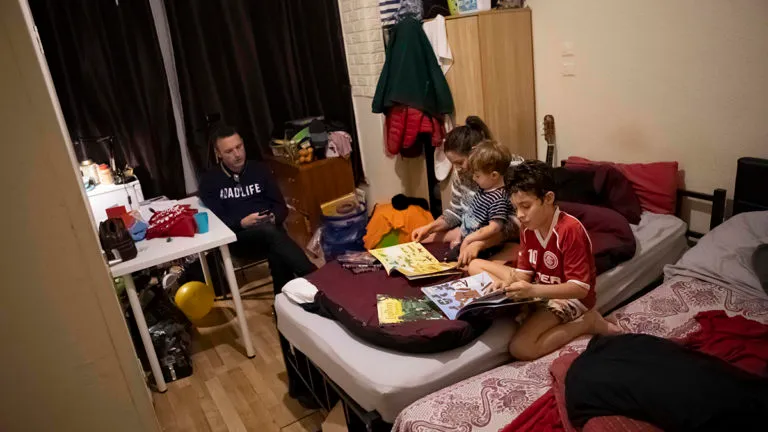Not-so-temporary accommodation
Published: by Jenny Pennington

The housing emergency and subsequent cost of living crisis are pushing thousands of households into homelessness.
New statistics show that over 150,000 households became homeless across just the first six months of 2022. But what happens to the increasing numbers of people pushed onto the homelessness safety net?
In England, councils have a duty to support most families experiencing homelessness to find a suitable, settled home. Until a suitable home can be offered, they provide ‘temporary’ accommodation.
However, this safety net is failing to function – suitable settled accommodation (either a social or private tenancy of at least 12 months) is proving hard to find. So, temporary accommodation (TA) is not proving to be temporary at all.
• Two-thirds of families living in TA have been there for more than 12 months. In London, this rises to more than four-fifths
• Some families have been living in temporary accommodation for more than 10 years
• Even emergency accommodation (like homeless B&Bs), is increasingly being used to accommodate people long term. 1 in 4 families in B&Bs, reception centers and hostels (under homelessness legislation) have been there for more than a year. Half of London families in this type of accommodation have been there for more than a year
• Partly due to these long stays, the number of households living in temporary accommodation has almost doubled in just ten years. The acute shortage of affordable housing options means there’s little prospect of a route out
In fact, in the absence of safe secure social homes, we are seeing the steady growth of a new kind of government-provided housing. But one without tenancy rights, specific standards, or effective oversight. Temporary accommodation was never designed to be a place where people build lives and children thrive. Yet it is now being relied on to provide that function for hundreds of thousands of people.
So what’s the impact of forcing hundreds of thousands of people to live like this?
Over the last 6 months, we’ve been exploring the impact of this breakdown of our housing system on the people forced to experience it.
This is something we have gathered insight on for years, and others have too. And this research revealed shocking stories and compelling evidence that change is needed. But there hasn’t been any broadly representative, quantitative research on temporary accommodation carried out since our last research in 2004 – a time when the housing emergency was nowhere near as bad as it is today. Without up-to-date data, the extent of issues, and their impacts, can be ignored.
So, following a period of qualitative research and consultation, led by experts by experience, (as we reported back in February), we have set out to fill that data gap by conducting the largest-ever survey of households living in temporary accommodation.
Filling the data gap
Over the spring, led by a steering group of people with lived experience of homelessness, we drafted the survey questions.
We partnered with local authorities across England to pilot, and then launch the full survey in June. Participants were contacted by post and email and given the option to complete the fifteen-minute survey online or over the telephone. By the time we closed it in August, we’d received 1,112 full responses. People stuck in temporary accommodation are clearly very keen to have their voices heard.
We’ve spent the last few months cleaning and verifying this data, crunching the numbers, and working closely with our steering group to interpret the results.
We now have a trove of results that give fresh new insight into what temporary accommodation is like, how it affects day-to-day life and the impacts of being forced to build a life on temporary foundations.
Over the next couple of months, we’ll start to share the results here, and start a conversation about how to ensure we have a housing system, and homelessness safety net, that allows families to thrive, rather than simply survive.
Please follow the blog for releases of the data. And email TAresearch@shelter.org.uk if you want to know more about these plans and how you can get involved.
In the meantime, please help us to support the thousands of families stuck in temporary accommodation this winter:
Make a donation today or campaign with us to tell the PM to protect people from homelessness.